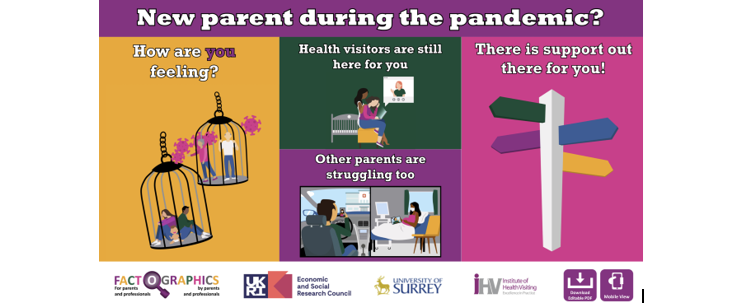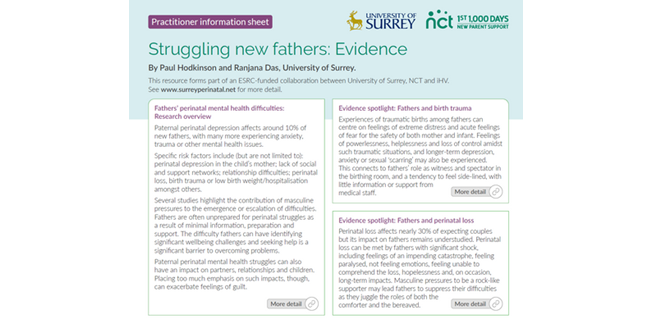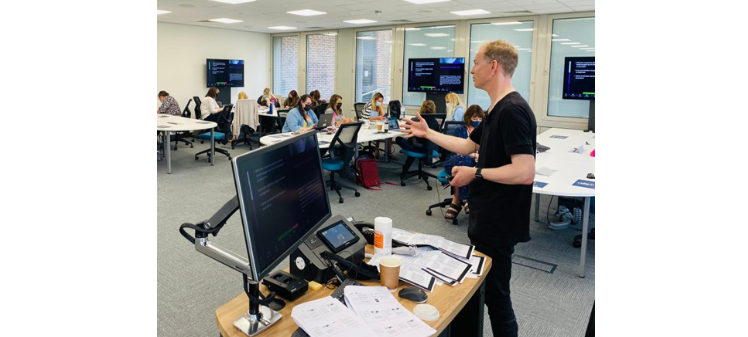By Ranjana Das and Paul Hodkinson
We write this blog post at the end of an impact partnership to enhance the wellbeing of new parents. The project was funded by an ESRC impact acceleration award and followed various pieces of individual and joint research on the mental health of new parents and the role of digital technologies. Our research had already translated into a selection of journal articles and books on the subject and, subsequently, we were particularly fortunate to have the opportunity to translate our research findings into a set of creative and constructive interventions to support parents over the last year in partnership with the Institute of Health Visiting and the National Childbirth Trust. Details and outputs from this partnership are covered comprehensively on our website, but in this blog post we summarise the journey we took from research to impact.
The research
We began our impact project after the completion of a set of individual and joint projects related to the mental health of new parents and, often, the role of digital technologies. These projects looked at the mental health of new mothers (funded by the British Academy), and the mental health of new fathers (funded by the University of Surrey). In both of these cases we considered particularly the role of digital technologies. The impact award was also informed by a project on the mental health of South Asian migrant mothers (funded by the Wellcome Trust) and a project on the impact of COVID-19 on pregnancy and maternity (funded by the University of Surrey).
Across these projects we identified the significant role played by gendered societal expectations on both men and women during the perinatal period before and after having a baby. For mothers this often took the form of intense pressures to mother in specific ways and expectations to feel emotionally positive through the experience to suit specific social cultural norms, and for fathers, we saw a tendency to regard their own experience as unimportant as compared to the mother, as well as gendered imperatives to be stoic and strong in the face of adversity. We found that the role of digital technologies was mixed, sometimes offering useful ways of finding both information, self disclosure and support, but remaining somewhat ambiguous in their overall benefits.
From research to practice
We took these research findings into an impact partnership with leading national organisations which do fantastic work with new parents and families in the United Kingdom.
With our partners at the Institute of Health Visiting we produced a set of digital and mobile friendly resources called Factographics which centred on carefully selected clickable images to represent key issues faced by new parents that were identified in our research findings. The resources also included lived experiences of new parents as videos, and pointed struggling parents to a variety of resources and organisations that might offer support. These resources were specifically developed for new fathers, new parents amidst the pandemic (above) and for mothers from South Asian communities struggling with their mental health. Each resource was the outcome of careful and repeated deliberation by a forum of practitioners and parents in addition to ourselves as researchers.
In partnership with the National Childbirth Trust we developed a set of evidence reviews to inform the development of parent-facing content and each such review shined a spotlight on specific areas of parental mental health that can be neglected, particularly in relation to the wellbeing of new fathers and migrant mothers. Also for the National Childbirth Trust we were able to take our research findings on the experiences of new fathers into practice by designing a set of learning materials and an information sheet, and delivering training for practitioners on the struggles fathers can face and the kinds of information and support they need. We also engaged with a variety of other practitioners, organisations and parents through both small and larger-scale events.
The suite of resources and events developed enabled us to convert specific research findings from our books and journal papers into co-produced resources and materials with the potential to enhance support for new parents, both directly and via the work of practitioner communities.
Future steps
As we write this end of project post, we have been involved with trialling these resources across various practitioner hubs and collecting feedback in a range of different ways. Early feedback has indicate that 90% health visitors who have responded so far to a survey on the Factographics hope to use them in their own practice. Referring to the Factographic for new fathers, one health visitor commented:
‘It’s really easy to use. I really like the support links available as this is what dads struggle with – where do I find the information for support? Many dads prefer to refer themselves for mental health support rather than through their health visitor. I will be sharing the link with fathers on my home visiting contacts.’ (Health Visitor)
NCT training and resources appear also to have been well-received, with good attendance at sessions and positive feedback from those present. Kathryn Kelly, who we worked closely with on the project, highlighted the value of the events and materials on fathers in enhancing practice in this developing area:
‘The webinar and associated resources you provided filled a gap in our provision for practitioners, as we had no previous internal CPD provision specifically around perinatal mental health in fathers.’ (Kathryn Kelly, NCT).
Our lessons from these few years of work are many, foremost amongst which is a note to ourselves to make time within project lifespans to incorporate evaluation activities following work of this kind, and to recognise the effort and resources that evaluation can demand. But most of all we conclude this project with an enormous sense of pride and achievement in seeing research about which we are so passionate transformed into real support for struggling parents. We would like to sincerely thank the Institute of Health Visiting and National Childbirth Trust – and particularly those individuals with whom we worked closely – for their collaboration in this work, and also the ESRC Impact Acceleration Account at the University of Surrey for its support.
Our experience and sense of achievement from this work, and the lessons we have learnt, we think, will persist in future research – and hopefully interventions – we develop in relation to our interests in parenthood, families, and life in digital societies.
*Please note that articles published on this blog reflect the views of the author/s and do not necessarily reflect those of the Department of Sociology.



